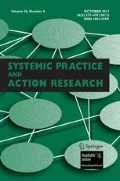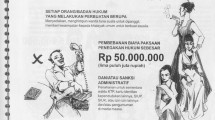Abstract
This article considers policy making in practice focussing on case studies drawn from ethnographic research on prostitution in Indonesia carried out between 2012 and 2013 (this article is based on field research undertaken in Java, Indonesia, between November 2012 and 28 February 2013). Its theoretical underpinnings is that of ‘critical systemic heuristics’ which contends that policy making with respect to prostitution needs to take into account a range of factors and diverse views based on a process of ‘unfolding values’ and ‘sweeping in’ many variables before a decision is made. Applying ‘critical systemic approach’ or ‘critical heuristics’provides a means to test out the policy making ideas, as opposed to merely implementing the ideas of the powerful. The paper applies critical heuristic thinking to argue that the policy response ought to take into account the voices of those with a lived experience of poverty and prostitution, in order to protect their rights when making policy decisions.
Similar content being viewed by others
Notes
Combining the critical ethnographic approach with case study, the attempt is expected to investigate the issue of prostitution within the bounded social systems of the Indonesian community surrounded by the uniqueness of different cases of differing lenses of policy providers on how a policy should respond to the issue.
The research design, strategy and rationale for the research has been detailed in Riswanda et al. (2016, pp. 5–7).
Ibid.
See Women in National Parliaments; http://www.ipu.org/wmn-e/world.htm [Consulted 28/09/2015].
“Balai karya wanita-program rehabilitasi social”/.
See Riswanda et al. (2016).
According to Riswanda’s interview with Mrs BaikHati, approximately 70 % of young women living in rural and semi-urban areas in Indonesia get married while they are still at school and almost half are divorced a few years after.
According to research by Riono (2008), most warias rely on prostitution for survival, as a result of their lack of education, older age, or experiencing social discrimination. Riono’s research conducted in Jakarta, Bandung and Surabaya indicates that 94 % of warias are involved in prostitution.
‘A “waria” is an Indonesian transsexual. [The term is] derived from the word “wanita” meaning woman and “pria” meaning man. Waria is known as Indonesia’s third sex. This century old tradition is largely accepted as part of Indonesian culture. However, it is one that does not sit easily with Islam since Islamic law acknowledges only two sexes, male and female See Brooks 2014, 01.53–02.54.
From the lead author’s interview with “S”, a waria and former prostitute, who is now directing an NGO mainstreaming prostitutes’ rights in Bandung).
In Riswanda’s interview with L (8 January 2013), a waria who is now a managing director of Srikandi Pasundan, a well-known NGO mainstreaming the rights of Indonesian transgender groups, spoke of the preconception that warias can only work in beauty salons, or else as singing beggars or prostitutes. This perception has shaped the government social programs that address the issues of the warias.
According to Indonesian Interfaith Network on HIV and AIDS (INTERNA) cited in Martudji (2011, p. 2), the number of people with HIV/AIDS in the city is 5091, which is higher than Papua (4005 people) and Jakarta (3998 people).
Enacted by the Indonesian government in the Criminal Code (KUHP-KitabUndang-UndangHukumPidana/Penal Code) articles 296, 297 and 506.
Sharia is Islamic religious law that oversees religious customs and provides guidance of everyday life in Islam as to reflect Quran (Islamic sacred book) and Muhammad’s examples (Esposito 2003).
References
Ariyanto and Triawan (2008) Jadi, kau tak merasa bersalah!? Studi kasus diskriminasi dan kekerasan terhadap LGBTI [So, you don’t feel guilty? a case study: discrimination and violence against LGBTI], Arus Pelangi and TIFA foundation, Indonesia
Asmarani D (2004) Indonesia’s shameful export: poverty, ignorance and unenforced laws fuel an industry that has sold 70,000 children into prostitution overseas, The Strait Times, 8 June 2004, p. 2
Baker S (2007) Child labour and child prostitution in Thailand: changing realities. White Lotus Press, Bangkok
Berita Informasi Seputar Indonesia Terkini (2013) Kisah Ayu sang pelacur kelas atas yang bermodal ijazah palsu untuk menjadi simpanan dosen (The story of Ayu a so-called high class prostitute who uses a fake diploma to have an affair with a lecturer’). Berita Informasi Seputar Indonesia Terkini: kisah seputar kehidupan masyarakat Indonesia, 9 October, pp. 1-4, http://akuindonesiana.wordpress.com/2013/10/09/kisah-ayu-sang-pelacur-kelas-atas-yang-bermodal-ijazah-palsu-untuk-menjadi-simpanan-dosen/.Accessed 31 March 2014
Bridgman P, Davis G (2000) The Australian policy handbook, 2nd edn. Allen & Unwin, Sydney
Brooks H (2014) The vice guide to travel: the warias, ABC I-view. http://www.vice.com/the-vice-guide-to-travel/the-warias-full-length. Accessed 21 June 2014
Budianta M (2006) Decentralizing engagements: women and the democratization process in Indonesia. Signs J Women Cult Soc 31(4):918
Dhakidae D (1979) Industri seks: sebuah tinjauan sosio-ekonomi, Prisma. LP3ES, Jakarta
Diani F (2007) Kantung-kantung prostitusi jalanan ibu kota (Areas of street prostitution in the capital city). HitamPutih, PT. Indosiar Visual Mandiri. http://news.indosiar.com/news_read.htm?id=60833.accessed. Accessed 29 December 2007
Doezema J (1998) Forced to choose: beyond the voluntary vs. forced prostitution dichotomy. In: Kempadoo K (ed) Global sex workers: rights, resistance and redefinition. Routledge, New York, pp 34–37
Douglas M (1998) Purity and danger: an analysis of the concepts of pollution and taboo. Ark Paperbacks, London
Duong LB (2002) Vietnam: children in prostitution in Hanoi, Hai Phong, Ho Chi Minh City and Can Tho: a rapid assessment. ILO/IPEC, Geneva
Ekberg G (2004) The Swedish laws that prohibits the purchase of sexual services: best practices for prevention of prostitution and trafficking in human being. Violence Against Women 10(10):1187–1218
Esposito J (ed) (2003) The Oxford dictionary of Islam. Oxford University Press, Oxford
Gauntlett D (2002) Media, gender and identity. Routledge, London
Hadriani P (2013) Waria wafat masih menimbulkan debat (when they pass away, warias [Indonesian transgender] still creating debate). TEMPO.CO-Gaya, 23 November. http://www.tempo.co/read/news/2013/11/23/110531873/Waria-Wafat-Masih-Menimbulkan-Debat Accessed 26 June 2014
Hart M, Brush C, Greene P, Gatewood E, Carter N (2002) Women of the venture capital industry: do they make a difference? In: Babson College-Kauffman Foundation Entrepreneurship Research Conference, Boulder, Connecticut
Indonesian Bureau of Statistics (2012) Public welfare statistics 2011. BPS [Indonesian Bureau of Statistics], Jakarta
Indonesian Bureau of Statistics (2013) Public welfare statistics 2012. BPS [Indonesian Bureau of Statistics], Jakarta
International Parliamentary Union (IPU) (2015) Women in parliaments. http://www.ipu.org/wmn-e/world.htm. Accessed 28 Sept 2015
Irwanto NF, Imelda JD (2001) Trafficking of children in Indonesia: a preliminary description of the situation. In: International programme on the elimination of child labour, collaborating International Labour Organization and Department of Social Welfare, University of Indonesia
James A, Jenks C, Prout A (1998) Theorizing childhood. Polity Press, Cambridge
Jones GW, Sulistyaningsih E, Hull TH (1995) Prostitution in Indonesia. Research School of Social Science, The Australian National University Canberra, Working Papers in Demography no. 52
Kementrian Koordinator Bidang Kesejahteraan Rakyat (2005) Pemberantasan perdagangan manusia (trafficking in persons) di Indonesia. Menkokesra, Jakarta
KOMPAS (2003) Mencari cinta dalam hati ibunda (Looking for love inside mother’s heart). KOMPAS, 23 June. http://www.kompas.com/kompas-cetak/0306/23/swara/385431.htm. Accessed 21 January 2009
Lalor KJ (1999) The victimization of juvenile prostitutes in Ethiopia. Int Soc Work 43(2):227–242
Martudji T (2011) Lokalisasi Dolly harus segera ditutup, Vivanews, 2 December. http://nasional.news.viva.co.id/news/read/268929-mui–lokalisasi-dolly-harus-segera-ditutup. Accessed 5 January 2012
McIntyre-Mills J (ed.) (2006a) Rescuing the enlightenment from itself: critical and systemic implications for democracy, C. West Churchman and related works series, vol. 1. Springer, London
McIntyre-Mills J (2006b) Systemic governance and accountability: working and reworking the conceptual and spatial boundaries of international relations and governance, vol 3., C. West Churchman and related works series. Springer, London
McIntyre-Mills J (2014) Systemic ethics and non-anthropocentric stewardship: implications for transdisciplinary and cosmopolitan politics, Springer, New York
McIntyre-Mills J, De Vries DB (2011) Identity, democracy and sustainability, Emergent Publications, Litchfield Park
Ministry of Women’s Empowerment and Child Protection (2013) Keterwakilan perempuan di lembaga legislatif (Women’s representation in legislative assembly). KPPA, Jakarta
Monroe J (2005) Women in street prostitution the result of poverty and the brunt of inequity J Poverty. Innov Soc Polit Econ Inequal 9(3):69–88
Montgomery H (2001) Modern Babylon: prostituting children in Thailand. Berghan Books, Oxford
Nussbaum M (2000) Women and human development: the capabilities approach. Cambridge University Press, Cambridge
Nussbaum M (2010) From disgust to humanity: sexual orientation and constitutional law. Oxford University Press, New York
Nussbaum MC, Glover J (eds) (1995) Women, culture, and development: a study of human capabilities. Oxford University Press, New York
Oey-Gardiner M (1997) Feminisasi dunia pendidikan (Feminisation of education). In: Notosusanto S, Purwandari EK (eds) Perempuan dan pemberdayaan. PSW Universitas Indonesia, Kompas and Obor Foundation, Jakarta
Pedersen W, Hegna K (2003) Children and adolescents who sell sex: a community study. Soc Sci Med 56:135–147
Pinheiro PS (2006) World report on violence against children. United Nations (United Nations Publishing Services), Geneva, Switzerland
Puradireja DI, Coast E (2012) Transactional sex risk across a typology of rural and urban female sex workers in Indonesia: a mixed methods study. PLoS One 7(12):e52858. doi:10.1371/journal.pone.0052858
Riono P (2008) Sexual behaviour among waria in 3 Indonesian cities. In: International AIDS conference. Mexico City, 3–8 August
Riswanda, Corcoran-Nantes Y, McIntyre-Mills J (2016) Re-framing prostitution in Indonesia: a critical systemic approach. Syst Pract Action Res. doi: 10.1007/s11213-016-9379-2
Sen A (1999) Development as freedom. Oxford University Press, Oxford
Serambi Indonesia (2011) PSK: banyak polisi yang jadi langganan kami (Many police officers become our clients). Serambi Indonesia—Tribun Network, 19 December. http://aceh.tribunnews.com/2011/12/19/psk-banyak-polisi-yang-jadi-langganan-kami. Accessed 10 July 2014
Sitompul L (2007) Waria tuntut persamaan hak (WariasWarias [Indonesian transgender] demand equality of rights). TEMPO, http://www.tempo.co/read/news/2007/05/10/05599805/Waria-Tuntut-Persamaan-Hak. Accessed 19 August 2014
Sjarifoedin A (2009) Menyingkap tabir kehidupan malam cewek-cewek gaul sekolahan (Disclosing covert nightlife of school-aged social butterfly). Griya Media Prima, Indonesia
Statistic Indonesia (2013) Statistik Kesejahteraan Rakyat 2012. BPS, Jakarta
Suyanto B (2000) Komersialisasi dan eksploitasi seksual anak perempuan (Commercialisation and sexual exploitation of female children). Lembaga Perlindungan Anak & UNICEF
Tampubolon HD (2010) Quick money lures young girls into prostitution. The Jakarta Post, 23 November.http://www.thejakartapost.com/news/2010/11/23/quick-money-lures-young-girls-prostitution.html. Accessed 4 April 2011
Troung TD (1992) Seks, uang, dankekuasaan: pariwisata dan pelacuran di Asia Tenggara (Sex, money and power: tourism and prostitution in South East Asia). LP3ES, Jakarta
TvOne (2009) Ratusan PSK demo DPRD, TvOnenews. http://video.tvonenews.tv/arsip/view/19520/2009/08/05/ratusan_psk_demo_dprd.tvOne. Accessed 28 April 2012
WHO (2002) World report on violence and health. World Health Organization, Geneva
Wolvers I, Triyoga RS, Basuki E, Yudhi D, Deville W, Hargono R (1999) Pacar and tamu: indonesian women sex workers’ relationships with men. Cult Health Sexual 1(1):39–53
Author information
Authors and Affiliations
Corresponding author
Rights and permissions
About this article
Cite this article
Riswanda, McIntyre-Mills, J. & Corcoran-Nantes, Y. Prostitution and Human Rights in Indonesia: A Critical Systemic Review of Policy Discourses and Scenarios. Syst Pract Action Res 30, 213–237 (2017). https://doi.org/10.1007/s11213-016-9393-4
Published:
Issue Date:
DOI: https://doi.org/10.1007/s11213-016-9393-4




